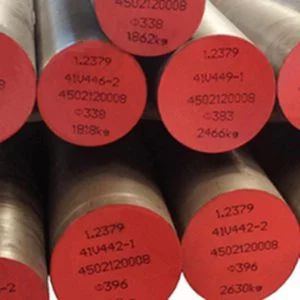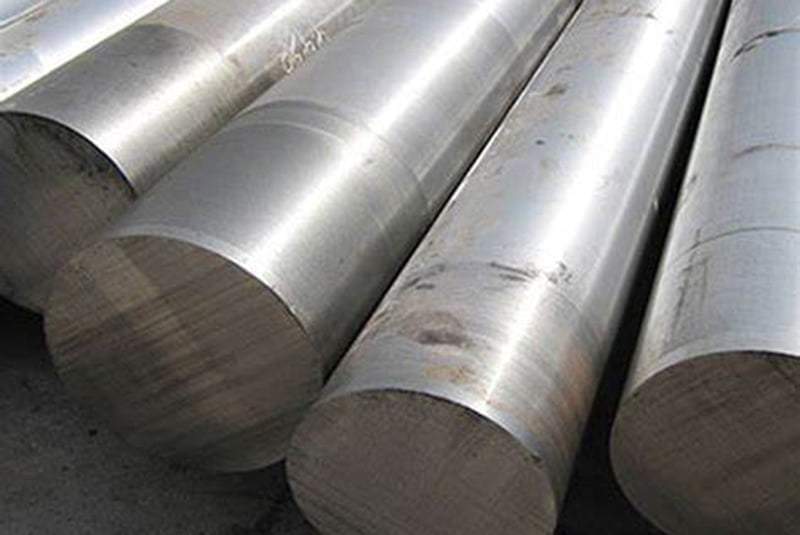Introduction

D2 steel, renowned for its exceptional hardness and wear resistance, stands as a testament to the marvels of metallurgy. This alloy, primarily composed of carbon and chromium, finds extensive application in the manufacturing of cutting tools, knives, and industrial machinery components. Delving into the depths of its composition and properties unveils a fascinating narrative of scientific ingenuity and practical utility.
Properties of D2 Steel
The distinctive properties of D2 steel stem from its composition and microstructure:
Hardness:D2 tool steel’s exceptional hardness is a result of its high carbon content and the formation of carbides during heat treatment. With a typical hardness ranging between 58 to 62 HRC (Rockwell Hardness Scale), D2 tool steel surpasses many other tool steels in terms of hardness. This property makes it well-suited for applications where high wear resistance and dimensional stability are crucial, such as precision cutting tools, punches, and dies used in metalworking.
Wear Resistance:The high chromium content in D2 tool steel plays a pivotal role in imparting excellent wear resistance. Chromium forms carbides during the heat treatment process, which are dispersed throughout the steel matrix. These carbides enhance the steel’s ability to withstand abrasive wear, resulting in prolonged tool life even under harsh operating conditions. As a result, D2 tool steel is often preferred for applications involving continuous cutting, shaping, or forming of abrasive materials like wood, plastics, and metals.
Toughness:Despite its high hardness, D2 tool steel exhibits considerable toughness, allowing it to withstand mechanical impacts without fracturing easily. This attribute is crucial for tools and components subjected to high loads or sudden shocks during operation. The balance between hardness and toughness in D2 steel is achieved through precise control of its composition and heat treatment parameters. This combination of properties makes D2 tool steel well-suited for applications where both cutting efficiency and durability are essential, such as industrial knives, shear blades, and cold working tools.
Corrosion Resistance:The presence of chromium in D2 steel not only enhances its hardness and wear resistance but also contributes to its corrosion resistance. Chromium forms a passive oxide layer on the surface of the steel, which acts as a barrier against corrosive agents such as moisture and chemicals. This inherent corrosion resistance minimizes the risk of rust formation and extends the lifespan of tools and components made from D2 tool steel. However, it’s important to note that while D2 tool steel exhibits good corrosion resistance compared to many other tool steels, proper maintenance and storage practices are still necessary to prevent corrosion in challenging environments.
Edge Retention:D2 steel’s fine grain structure is conducive to superior edge retention, allowing cutting tools to maintain sharpness over extended periods of use. The fine grains present in the microstructure enable the steel to form and retain a keen cutting edge, even when subjected to repetitive cutting tasks or abrasive materials. This property makes D2 tool steel highly desirable for applications where precise and clean cuts are essential, such as in the manufacture of fine woodworking tools, precision instruments, and surgical blades.
Heat Treatment of D2 Steel
The heat treatment process plays a pivotal role in optimizing the properties of D2 steel. It typically involves:
- Annealing: Heating the steel to a specific temperature range followed by controlled cooling, to relieve internal stresses and improve machinability.
- Quenching: Rapid cooling of the annealed steel in a quenching medium such as oil or air to achieve maximum hardness.
- Tempering: Reheating the quenched steel to a precise temperature and holding it for a specified duration to enhance toughness and reduce brittleness.
Applications of D2 Steel
D2 steel’s exceptional properties make it indispensable in various industrial sectors, including:
- Cutting Tools: D2 steel is widely used for manufacturing high-performance cutting tools such as drills, milling cutters, and dies, owing to its superior hardness and wear resistance.
- Knife Making: Knife enthusiasts and professional craftsmen favor D2 tool steel for its ability to retain a sharp edge, making it suitable for crafting durable and reliable knives.
- Industrial Machinery: Components subject to abrasive wear and heavy loads, such as punches, shear blades, and forming dies, benefit from the exceptional properties of D2 tool steel.
Composition of D2 Steel

At the heart of D2 tool steel lies a carefully balanced composition of elements. Its primary constituents include:
| Element | Percentage by Weight |
|---|---|
| Carbon (C) | 1.40% |
| Chromium (Cr) | 12.00% |
| Molybdenum (Mo) | 1.00% |
| Vanadium (V) | 0.90% |
| Silicon (Si) | 0.60% |
| Manganese (Mn) | 0.60% |
Conclusion
In conclusion, the science behind D2 steel encapsulates a synergy of elemental composition, microstructural refinement, and precise heat treatment techniques. Its remarkable hardness, wear resistance, and toughness make it a preferred choice in demanding applications where performance and reliability are paramount. As metallurgical advancements continue to evolve, D2 steel stands as a testament to the enduring legacy of innovation in materials science.
FAQ
Q:Is D2 steel stainless?
A:While D2 steel exhibits good corrosion resistance due to its chromium content, it is not considered stainless steel. Proper maintenance is necessary to prevent rust formation.
Q:Can D2 steel be heat treated at home?
A:While basic heat treatment processes such as annealing can be performed with suitable equipment, achieving precise results often requires specialized industrial facilities and expertise.
Q:What are the alternatives to D2 steel?
A:Alternatives to D2 steel include other tool steels such as M2, A2, and O1, each offering unique combinations of properties suited to specific applications.
Q:Is D2 steel suitable for outdoor use?
A:While D2 steel offers good corrosion resistance, it is advisable to apply a protective coating or regularly maintain outdoor tools and knives to prevent corrosion in harsh environments.
